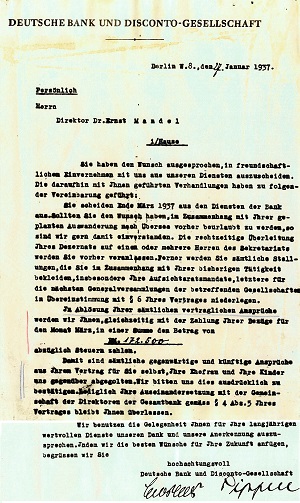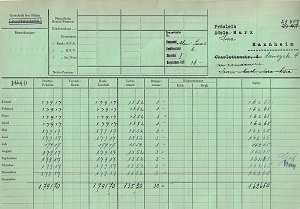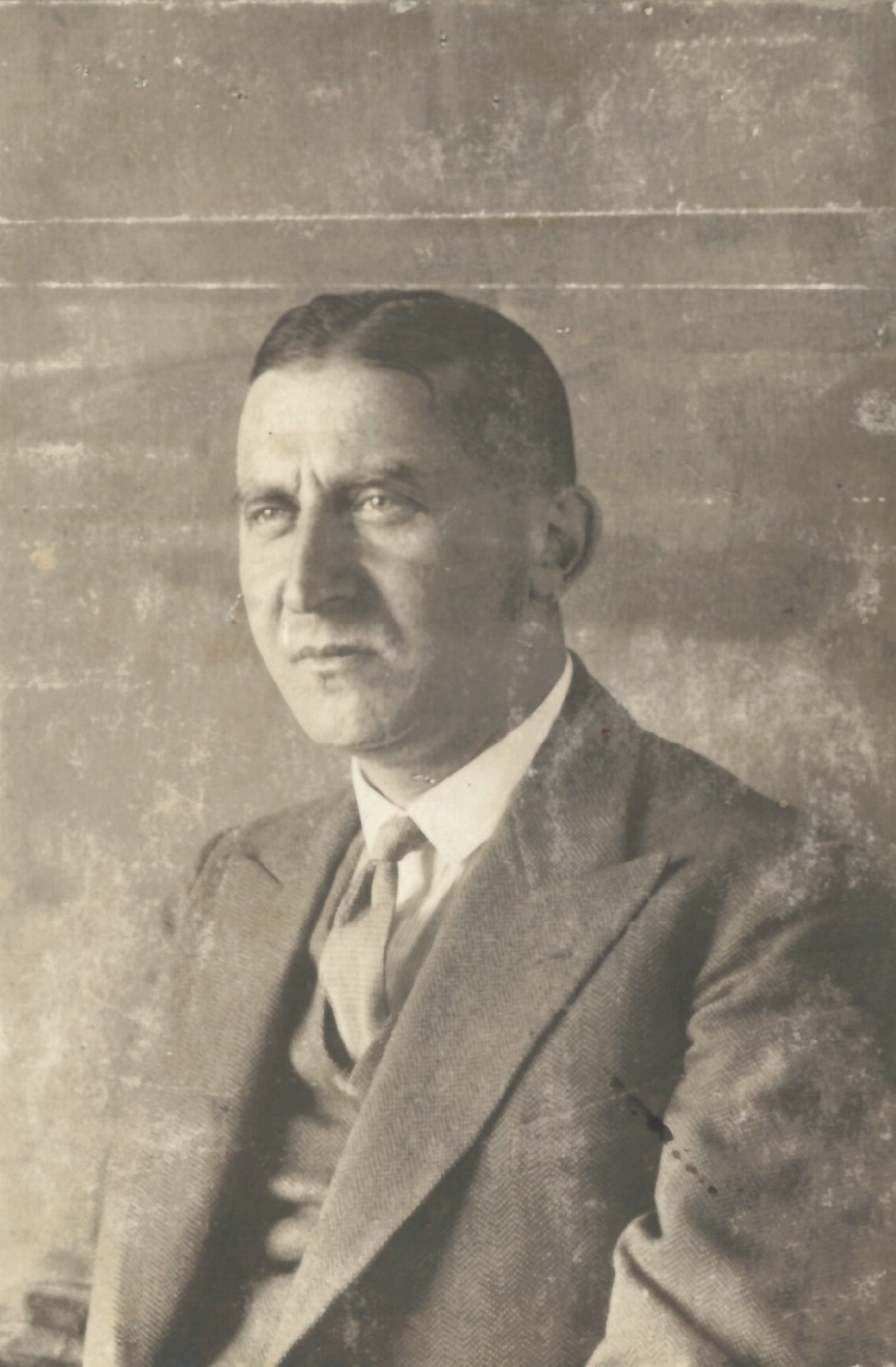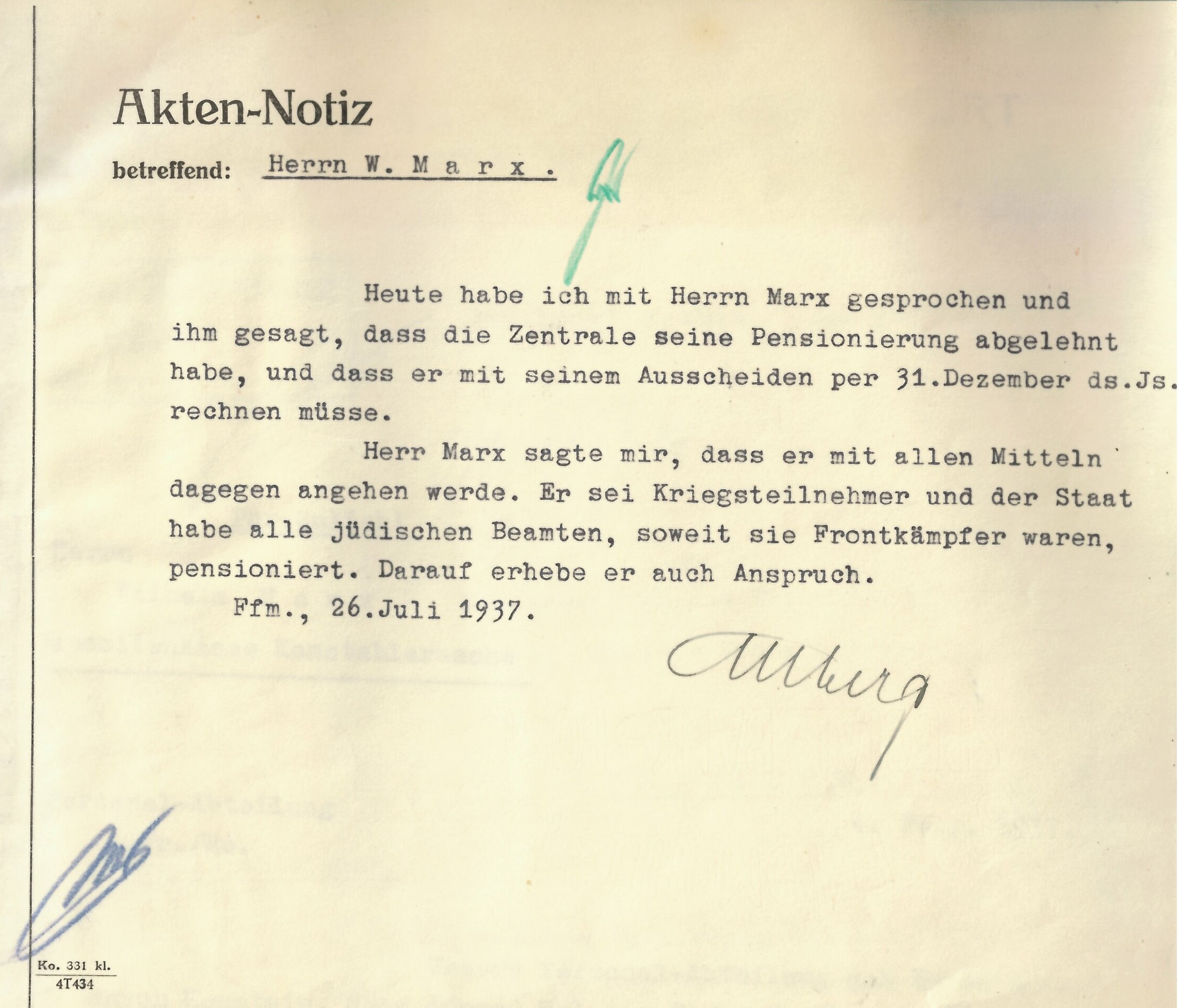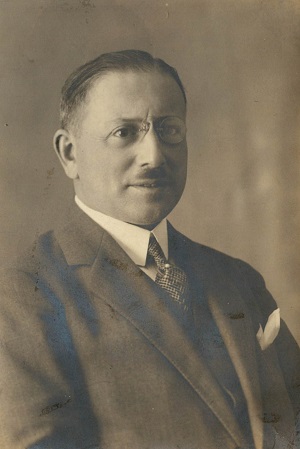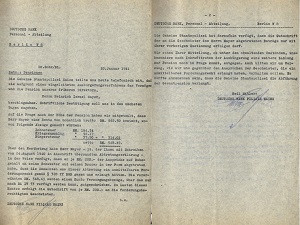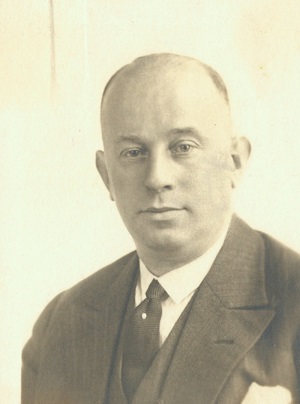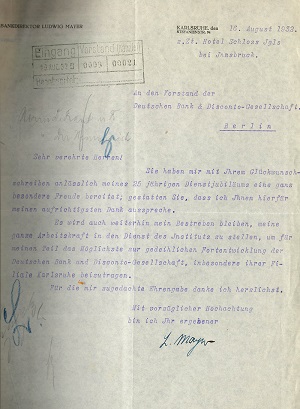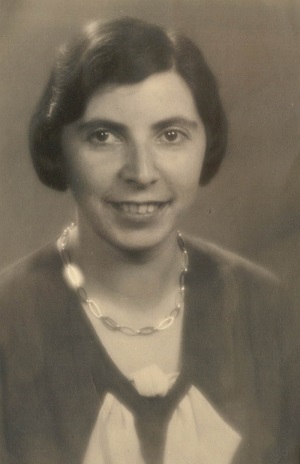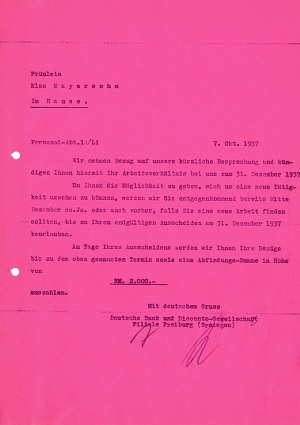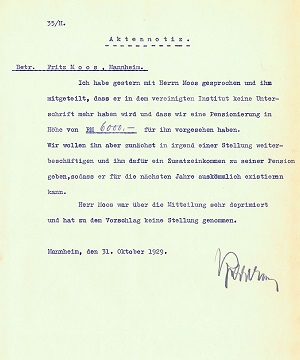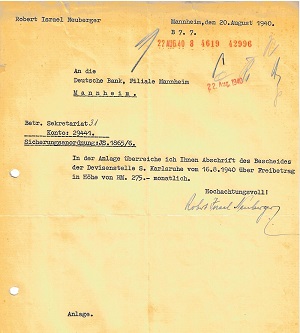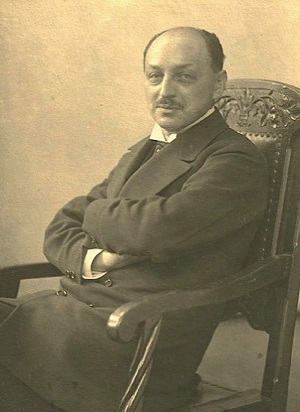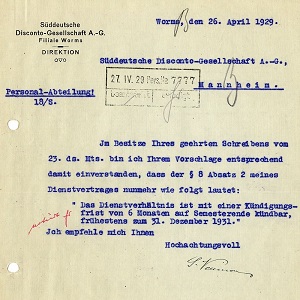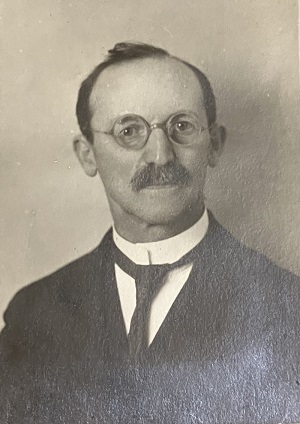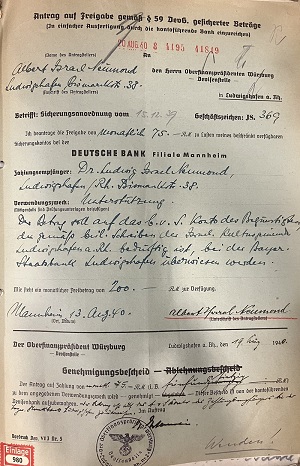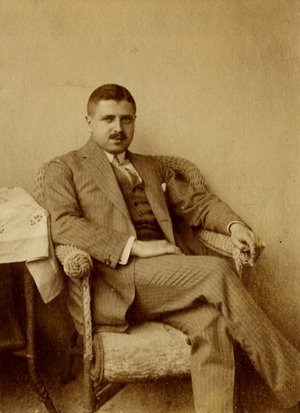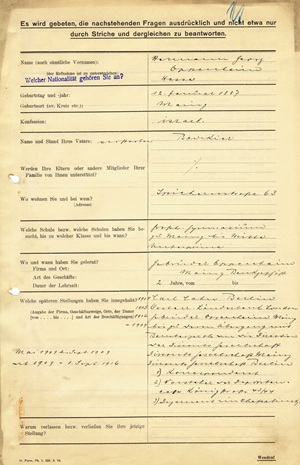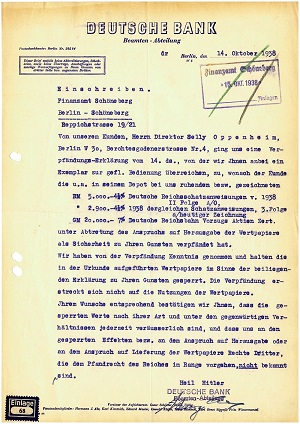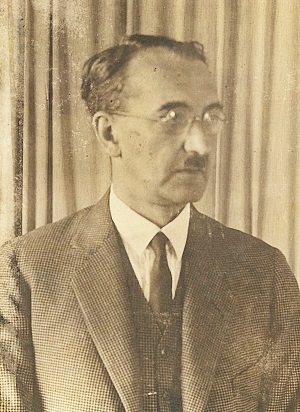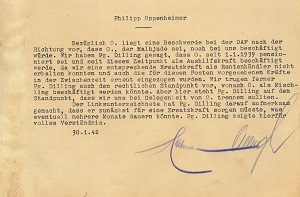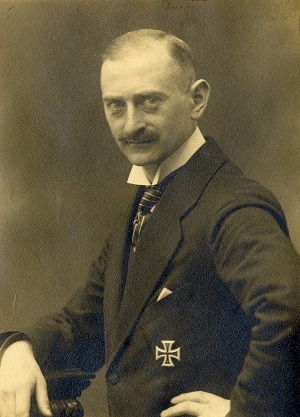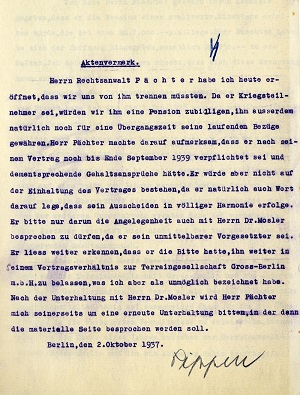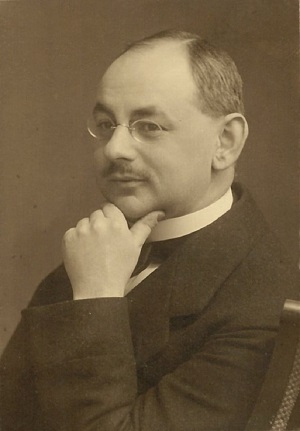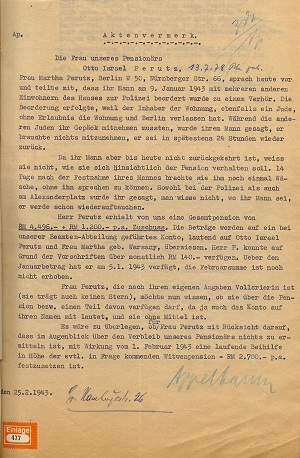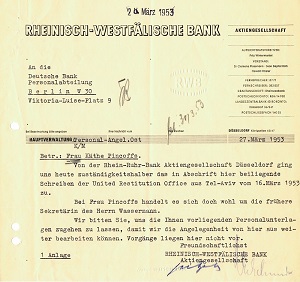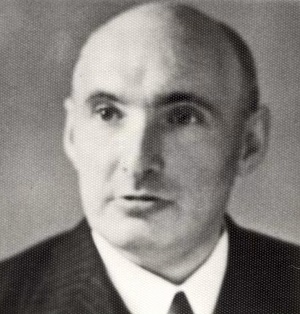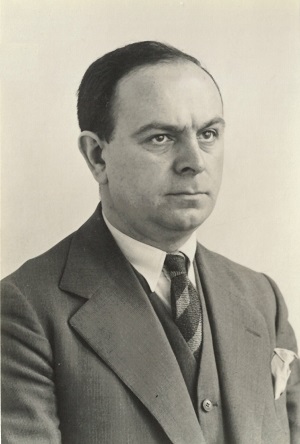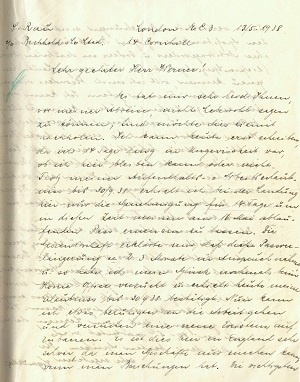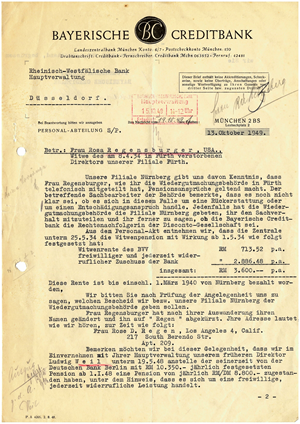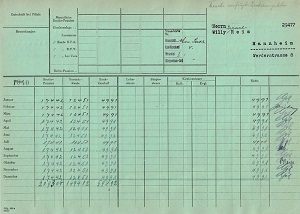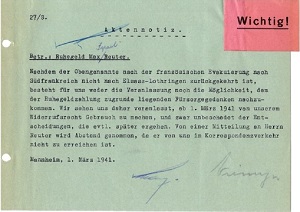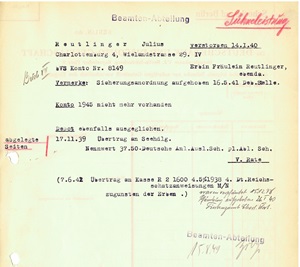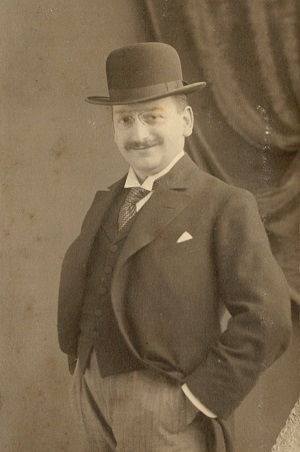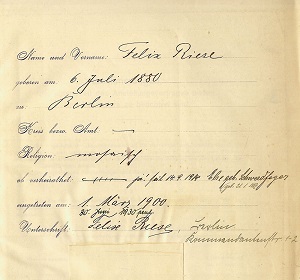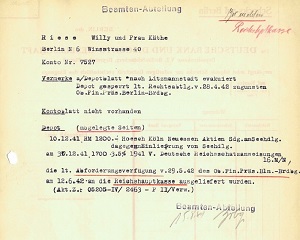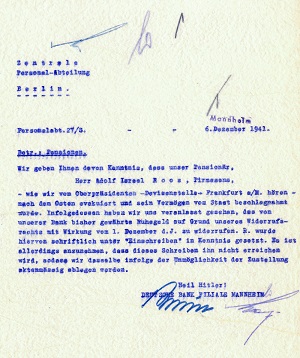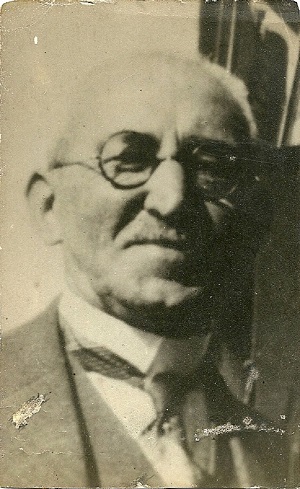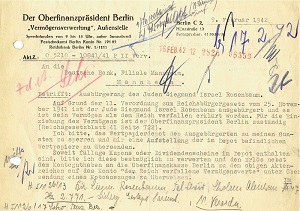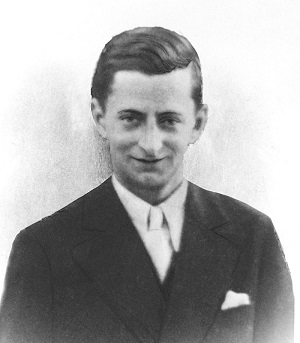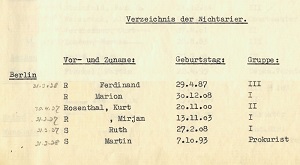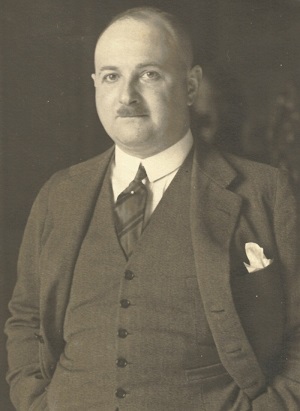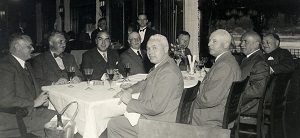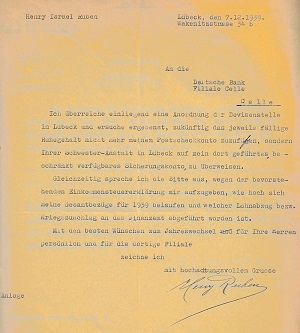Show content of Mainz, Willy
Show content of Mandel, Ernst A.
| first name(s), surname: | Ernst A. Mandel | ||
| day of birth: | 13.12.1887 | ||
| birthplace: | Bad Dürkheim | ||
| day of death: | 23.06.1978 | ||
| place of death: | Scarsdale, New York | ||
| document: |
|
||
| life: |
Ernst Mandel came from Bad Dürkheim in what was then the Bavarian Palatinate. His parents were David Mandel and Frieda Mandel, née Löb. He attended the Progymnasium in Bad Dürkheim and the Gymnasium in Neustadt an der Haardt until he passed his A-levels. In the summer of 1906, he began studying law, initially in Munich until the summer of 1909, interrupted by the winter semester of 1908-09 in Strasbourg. In the winter semester of 1909-10, he continued his studies at the University of Erlangen, where he also passed his first state examination in 1910. This was followed by a traineeship at the Bad Dürkheim district court, a year's military service in 1910-11 and further training at the Bad Dürkheim district court and Munich regional court. In 1912, Mandel was awarded his doctorate at the University of Erlangen with a dissertation entitled "The so-called external conditions of criminal liability under current law and under the preliminary draft". He completed his studies with the assessor exam. He probably did military service during the First World War. |
||
| joined Deutsche Bank (or precursor): | 01.04.1920 (Süddeutsche Disconto-Gesellschaft, Mannheim) | ||
| end of employment: | 31.03.1937 | ||
| career: |
01.04.1920 - 1923 Süddeutsche Disconto-Gesellschaft, Mannheim, board secretary |
||
| last known address: | Berlin-Schöneberg, Nymphenburger Strasse 6 | ||
| emigration: | 13.04.1937 to New York, United States | ||
| archival sources: | HADB, P33/M0016; P80/M0006, Universitätsarchiv der Friedrich-Alexander-Universität Erlangen-Nürnberg, Promotionsakte (UAE C2/3 Nr. 3444) |
Show content of Marx, Adele
| first name(s), surname: | Adele Marx | ||||
| day of birth: | 24.06.1888 | ||||
| birthplace: | Berlin | ||||
| day of death: | 31.08.1942 | ||||
| place of death: | Auschwitz | ||||
| document: |
|
||||
| life: | Adele Marx was the daughter of opera singer Karl Marx (actually Moritz Kimmelberg, 14 September 1861 in Budapest - 8 July 1933 in Mannheim) and his wife Mathilde, née Kolisch (10 November 1861 in Purkersdorf (Austria) - 5 December 1940 in Gurs). She was born in Berlin in 1888, when her father was on tour at the Kroll Opera House. From 1894 he was a member of the ensemble at the Court Theatre in Mannheim. The life of Adele Marx is largely unknown. She remained unmarried and probably worked for a long time in banking, presumably at one of the Mannheim predecessor institutions of Deutsche Bank und Disconto-Gesellschaft before 1929. She was employed at its Mannheim branch in salary group II until March 1937. Because of her Jewish origin, she was retired at the age of only 48. She received a transitional allowance of 1100 Reichsmark and from April 1937 a monthly pension of 179.17 Reichsmark, which was paid until October 1940. Adele Marx lived with her widowed mother in Mannheim. On 22 October 1940, the Baden and Saarpfalz Jews - including Adele and Mathilde Marx - were deported to the southwestern French internment camp Gurs. Mathilde Marx died in Gurs on 5 December 1940. Adele Marx was probably transferred to the Drancy assembly camp near Paris in 1942 and from there deported to Auschwitz on 10 August 1942, where she was murdered at the end of the same month. |
||||
| joined Deutsche Bank: | unknown | ||||
| end of employment: | 31.3.1937 | ||||
| career: |
unknown - 31.3.1937 Deutsche Bank und Disconto-Gesellschaft Mannheim branch |
||||
| last known address: | Mannheim, Charlottenstrasse 4; (from 1940) Mannheim, Lameystrasse 4 | ||||
| transports: | from Mannheim to Gurs on 20.10.1940 from Gurs to Drancy before 10.08.1942 from Drancy to Auschwitz on 10.08.1942 |
||||
| archival sources: | HADB, F028/0688; HADB, B381 | ||||
| links: |
https://www.mahnmal-neckarzimmern.de/gedenkbuch/marx-adele https://www.bundesarchiv.de/gedenkbuch/de925830 http://www.landesarchiv-bw.de/plink/?f=4-1753784 https://www.leo-bw.de/detail/-/Detail/details/PERSON/gurs_biogramme/4404/Marx+Mathilde https://www.marchivum.de/de/archiv/recherche/juedischer-friedhof/f2-b-09-04-marx-karl |
Show content of Marx, Willy
| first name(s), surname: | (Wilhelm) Willy Marx | ||||
| day of birth: | 10.05.1891 | ||||
| birthplace: | Bingen am Rhein | ||||
| day of death: | 11.08.1972 | ||||
| place of death: | Müllheim (Baden) | ||||
| photo / document: |
|
||||
| life: | Willy Marx was born in Bingen as the son of the department stores' owner Heinrich Marx. He completed his school education with the Abitur before learning the ropes at the Bank für Handel und Industrie in Berlin, where he was employed until he began his military service in 1915. Marx did military service until the end of the First World War and then worked for various banks: in the Bingen and Kreuznach branches of the Bank für Handel und Industrie, the Süddeutsche Disconto-Gesellschaft and the Lincoln Menny Oppenheimer banking house in Frankfurt. In 1922 Willy Marx married Luise Laubscher, who was "non-Jewish". In 1923, Marx joined Disconto-Gesellschaft Frankfurt am Main branch and worked in various departments there. After the merger of Disconto-Gesellschaft with Deutsche Bank, Marx continued to be employed at the cashier of city sub branches C in Frankfurt am Main. From the end of 1936, Marx initially received offers from Deutsche Bank to move to Jewish companies such as Bankhaus Heinrich Cahn & Co. or Kaufhaus F. Ehrenfeld. After he had rejected these offers, the bank separated from him on 31 June 1938 due to his Jewish origin. In December 1938 he was sentenced to three years in prison for violating the "Foreign Exchange Act". While still in custody, Marx suffered a stroke in October 1938. Due to his conviction, Deutsche Bank withdrew Marx's pension payments. After his release in 1941, Marx managed to emigrate with his wife and daughter to Montreal, where he lived until his death. The verdict against Marx for violating the "Foreign Exchange Act" was overturned on the basis of the Act for the Reparation of National Socialist Injustice in 1950. | ||||
| joined Deutsche Bank (or precursor): | 01.10.1923 | ||||
| end of employment: | 30.06.1938 | ||||
| career: | 1909 - 1915 Bank für Handel und Industrie Berlin (apprenticeship, employee) 1915 - 1918 military service 1918 - 1920 Bank für Handel und Industrie Bingen and Kreuznach branch 1920 - 1921 Süddeutsche Disconto-Gesellschaft 1922 - 1923 Lincoln Menny Oppenheimer 1923 - 1929 Disconto-Gesellschaft Frankfurt branch (foreign exchange settlement, security audit, cashier of city sub branches C) 1929 - 1937 Deutsche Bank und Disconto-Gesellschaft (cashier of city sub branches C) |
||||
| last known adress: | Frankfurt am Main, Kettelerallee 63 (1935-1945 renamed to Nussberg) | ||||
| emigration: | 1941 to Montreal | ||||
| archival sources: | HADB, P03/M0004; HADB, P03/M0006; HADB, P03/M0007; HADB, P03/M0093 |
Show content of Mayer, Heinrich
| first name(s), surname: | Heinrich Mayer | ||||
| day of birth: | 14.12.1878 | ||||
| birthplace: | Essenheim near Mainz | ||||
| day of death: | 15.05.1971 | ||||
| place of death: | Seattle, United States | ||||
| photo / document: |
|
||||
| life: | Heinrich Mayer was born in Essenheim, a winetown southwest of Mainz. His parents were the merchant Isaac Mayer and Emma Mayer, née Müller. He attended secondary school in Mainz and completed an apprenticeship at the private bank Gebrüder Oppenheim in Mainz, for which he worked after the end of his apprenticeship. In November 1908, the private bank Gebrüder Oppenheim merged with Bamberger & Co. in Mainz, where Mayer remained employed. Even when Bamberger & Co. was taken over by Disconto-Gesellschaft in June 1909 and converted into a branch, he continued to be part of the staff. In the three following decades, he rose to the position of a director of Disconto-Gesellschaft Mainz branch thanks to his special achievements. After the merger of Deutsche Bank and Disconto-Gesellschaft in 1929, Mayer remained director of the Mainz branch. By the end of 1936, all Jewish employees at the Mainz branch had been forced out with the exception of Heinrich Mayer. In May 1937, the NSDAP's district economic advisor took offence at Mayer's ongoing employment because it ran counter to his efforts to make the branch "free of Jews". The bank agreed with Mayer to resign on 31 December 1937. He was placed on leave with full salary for 1938 and received pension payments from 1 January 1939. During the course of 1939, Mayer and his family - he had been married to Else Oppenheimer (born 28 November 1896) since 12 September 1916 and had two children (Ernst and Marianne) - must have come to the decision to leave Germany. He sold his house (117 Ehrenhof 3 in Mainz) and moved into an apartment at Adam-Karillon-Strasse. On 11 August 1940, Mayer and his family emigrated to Seattle in the United States. Since the Atlantic route was impassable because of the war; they first took a plane from Germany to Moscow and then continued on to Seattle via Yokohama. At the beginning of 1941, the Gestapo confiscated all of his domestic assets and his pension. After the end of the war, pension payments were retroactively resumed. Mayer lived in Seattle until his death in 1971. |
||||
| joined Deutsche Bank (or precursor): | 08.11.1908 (Bamberger & Co.) | ||||
| end of employment: | 31.12.1937 | ||||
| career: | 13.03.1895 - 12.03.1897 Gebrüder Oppenheim, Mainz (apprenticeship) 13.03.1897 - 07.11.1908 Gebrüder Oppenheim, Mainz (employee) 08.11.1908 - 02.06.1909 Bamberger & Co., Mainz (employee) 03.06.1909 - 29.10.1929 Disconto-Gesellschaft Mainz branch (April 1911 assistant manager; 14.01.1913 holder of power of attorney 28.11.1919 deputy director; 28.11.1922, director) 29.10.1929 - 31.12.1937 Deutsche Bank und Disconto-Gesellschaft Mainz branch (director) |
||||
| last known adress: | Adam Karrillon-Strasse 58, Mainz | ||||
| emigration: | 11.08.1940 to Seattle, United States | ||||
| archival sources: | HADB, P1/145; P33/M31/I+II | ||||
| links: |
https://memorial-rotary.de/members/1065 https://www.alemannia-judaica.de/images/Images%20385/Essenheim%20KK%20MZ%20Mayer%20Heinrich.jpg |
Show content of Mayer, Ludwig
| first name(s), surname: | Ludwig Mayer | ||||
| day of birth: | 30.05.1885 | ||||
| birthplace: | Cologne | ||||
| year of death: | 1965 | ||||
| place of death: | probably London | ||||
| photo / document: |
|
||||
| life: | Ludwig Mayer originated from Cologne and completed secondary school in his hometown, followed by a banking apprenticeship at Albert Simon & Co. He then moved to Mannheim to work at Süddeutsche Disconto-Gesellschaft, which was founded in 1905. During a traineeship in London, he gained international experience in 1910-11 before returning back to Süddeutsche Disconto-Gesellschaft in Mannheim. At the end of 1911, Mayer moved to Süddeutsche Disconto-Gesellschaft Karlsruhe branch, where he subsequently rose to the position of director. After the integration of Süddeutsche Disconto-Gesellschaft into Deutsche Bank und Disconto-Gesellschaft in the autumn of 1929, Mayer remained in the Karlsruhe branch management. In mid-1935, the bank decided to retire Mayer early due to his Jewish descent. At the beginning of 1936 he was given leave of absence and retired on 31 March 1936. Mayer had been married to Gertrud (Trude), née Willstätter (born 16 January 1894 in Karlsruhe, died 1971 in London) since 17 April 1913. The couple had a son Hans-Karl (born 2 May 1914). On 25 June 1937 Mayer moved to Cologne with his wife. At the end of 1938, Mayer decided to emigrate and negotiated with the bank about a one-off severance payment on his pension, which was approved at the beginning of 1939. A little later he and his wife managed to emigrate to London, where they spent the rest of their lives. Her son Hans-Karl stayed in Germany and was deported to the Gurs camp in southern France on 22 October 1940, where he died on 6 December 1940. |
||||
| joined Deutsche Bank (or precursor): | 1906 (Süddeutsche Disconto-Gesellschaft) | ||||
| end of employment: | 31.03.1936 | ||||
| career: | 1903 - 1906 Albert Simon & Co., Köln (apprenticeship) 1906 - 1910 Süddeutsche Disconto-Gesellschaft, Mannheim (employee) 1910 - 1911 Singer, Manasse & Co., London (trainee) Beginning of 1911 - End of 1911 Süddeutsche Disconto-Gesellschaft, Mannheim (asisstant manager since 23.03.1911) End of 1911 - 29.10.1929 Süddeutsche Disconto-Gesellschaft Karlsruhe branch (assistant manager, holder of power of attorney since 30.07.1914, deputy director since 08.01.1917, director since 02.03.1921) 29.10.1929 - 31.03.1936 Deutsche Bank und Disconto-Gesellschaft Karlsruhe branch (director) |
||||
| last known adress: | Cologne, Stadtwaldgürtel 30 | ||||
| emigration: | 1939 to London, United Kingdom | ||||
| archival sources: | HADB, P02/M0178 | ||||
| links: |
https://gedenkbuch.karlsruhe.de/namen/2897 https://www.ancestry.co.uk/genealogy/records/gertrud-sofia-willst%C3%A4tter-24-18m0spc |
Show content of Mayersohn, Else
| first name(s), surname: | Else Mayersohn | ||||
| day of birth: | 08.08.1908 | ||||
| birthplace: | Rastatt | ||||
| day of death: | 04.12.1984 | ||||
| place of death: | Luton, United Kingdom | ||||
| photo / document: |
|
||||
| life: |
Else Mayersohn was born in Raststatt, the daughter of the teacher and cantor Emanuel Mayersohn and Rosa Mayersohn, née Levi. Her siblings were Max and Grete. In Raststatt, Mayersohn attended the primary school, the Höhere Töchterschule (higher girl's school) and the commercial school. Afterwards she completed a two-and-a-half-year commercial apprenticeship at the S. Weil & Söhne shoe factory, after which she worked there until May 1928. This was followed by a position as a clerk at Gebrüder Schönmann in Traben-Trarbach, before she began working as a clerk at Süddeutsche Disconto-Gesellschaft in Mannheim in September 1928. Mayersohn remained employed there even after the merger of Deutsche Bank and Disconto-Gesellschaft in October 1929 and moved to the Freiburg branch office of Deutsche Bank und Disconto-Gesellschaft in spring 1932 at her own request. On 31 December 1937, she was dismissed by the bank due to her Jewish descent. She received a severance payment of 2000 Reichsmark. However, Mayersohn was released early in October 1937 as she accepted a position at private bank Straus & Co. in Karlsruhe, which was founded in 1870 and whose owners were Jewish. On 6 May 1938, Straus & Co. was taken over together with all assets and liabilities as well as its non-Jewish employees by Badische Bank. It can be assumed that Mayersohn lost her job by this time at the latest. |
||||
| joined Deutsche Bank (or precursor) | 24.09.1928 (Süddeutsche Disconto-Gesellschaft, Mannheim) |
||||
| end of employment: | 16.10.1937 |
||||
| career: |
01.11.1923 - 31.10.1926 S. Weil & Söhne, Rastatt (apprenticeship) |
||||
| last known adress: | Badstrasse 4, Raststatt |
||||
| emigration: | By the end of 1938 via Switzerland to United Kingdom |
||||
| archival sources: | HADB, P25/M16; Rastatt municipal archives, birth register (RA: Nr. 219/1908), and residents' registration card index, "Mayersohn, Else Sofie"; Zurich City Archives, Residents' and Aliens' Registration Office of the City of Zurich, registration cards (V.E.c.100._1934-1964_185), and (V.E.c.100._1934-1964_186) |
||||
| literature: | Ingo Köhler, Die "Arisierung" der Privatbanken im Dritten Reich. Verdrängung, Ausschaltung und die Frage der Wiedergutmachung, Munich 2005, pp. 292-294, 437-438, 466-470. |
||||
| weblinks: |
https://ajr.org.uk/wp-content/uploads/2018/02/1976_march.pdf (p. 9, information on Kurt Karl Joachim) https://www.geni.com/people/Else-Sofie-Joachim/6000000013788679208
|
Show content of Moos, Fritz
| first name(s), surname: | Fritz Moos | ||
| day of birth: | 26.10.1874 | ||
| birthplace: | Bad Buchau | ||
| day of death: | 07.08.1963 | ||
| place of death: | London | ||
| document: |
|
||
| life: | Fritz Moos came from a Jewish family in Bad Buchau, Württemberg. His parents were Felix Ephraim Moos (20 April 1841 in Bad Buchau - 6 August 1932 in Bad Buchau) and Karoline, née Neuburger (13 January 1846 in Bad Buchau - 30 December 1916 in Bad Buchau). Nothing is known about his schooling. In 1889, at the age of 15, he began a three-year apprenticeship at the banking house Ch. Masson & Co. in Lausanne. Following this, he moved to the Badische Handelsbank in Karlsruhe, where he was promoted to an holder of power of attorney as early as 1897. A year later, he joined Commanditgesellschaft Weil & Benjamin, also based in Karlsruhe, for which he later worked in Mannheim. When Commanditgesellschaft Weil & Benjamin was acquired by Süddeutsche Disconto-Gesellschaft in 1906, Moos continued his work at its Mannheim head office. He was initially a holder of power of attorney and, from 1922, a department manager. In October 1929, Süddeutsche Disconto-Gesellschaft merged into the newly formed Deutsche Bank und Disconto-Gesellschaft. Moos, who was 55 years old, was among the employees who were not to be retained by the merged institution. His early retirement, which was originally planned for the end of 1929, was delayed until 1931. He received a monthly pension of 458.33 Reichsmark, which was paid until October 1940. Fritz Moos had married Ella Julia, née Goldschmidt (17 April 1885 in Mannheim - 3 May 1983 in London) on 7 August 1920. The couple had two children: Werner (18 June 1921 - August 2008 in London) and Gertrud (20 January 1923 - 2012 in London). The family lived at Moltkestrasse 4 in Mannheim until 1939. In June 1939, they managed to escape via the Netherlands to the United Kingdom, where the family settled in London. Fritz Moos died there in 1963. |
||
| joined Deutsche Bank (or precursor): | 01.07.1898 (Commanditgesellschaft Weil & Benjamin) | ||
| end of employment: | 1931 | ||
| career: | 29.11.1889 - 30.10.1892 Ch. Masson & Co., Lausanne (apprenticeship) 01.11.1892 - 30.06.1898 Badische Handelsbank, Karlsruhe (clerk, from 01.10.1897 holder of power of attorney) 01.07.1898 - 1906 Commanditgesellschaft Weil & Benjamin, Karlsruhe and Mannheim (holder of power of attorney) 1906 - 29.10.1929 Süddeutsche Disconto-Gesellschaft, Mannheim (from 1906 holder of power of attorney, from 1922 department manager) 30.10.1929 - 1931 Deutsche Bank und Disconto-Gesellschaft Mannheim branch (department manager) |
||
| last known address: | Mannheim, Moltkestrasse 4 | ||
| emigration: | via the Netherlands and Harwich to London on 07.06.1939 | ||
| archival sources: | HADB, P33/M004; HADB, F028/0688 | ||
| links: |
https://hohenemsgenealogy.at/getperson.php?personID=I11655&tree=Hohenems |
Show content of Neuberger, Robert
| first name(s), surname: | Robert Neuberger | ||
| day of birth: | 25.10.1882 | ||
| birthplace: | Mannheim | ||
| day of death: | after 17.08.1942 | ||
| place of death: | Auschwitz | ||
| document: |
|
||
| life: | Robert Neuberger came from Mannheim. His parents were Joseph Neuberger (17 August 1851 in Mannheim - 11 June 1918 in Mannheim) and Emilie née Neustadt (22 March 1852 in Darmstadt - 30 November 1916 in Mannheim). His educational and professional path is not known. In the 1930s, he worked as an employee at the Mannheim branch of Deutsche Bank und Disconto-Gesellschaft. By early 1937 at the latest, he was prematurely retired due to his Jewish origin. He received a monthly pension of 116.76 Reichsmark, which was paid until October 1940. Robert Neuberger was married to Elsa (Else) née Kaufmann (10 February 1880, in Mannheim - after 10 August 1942 in Auschwitz). The couple, who remained childless, lived in Mannheim until 22 October 1940. On that day, like many Baden and Saar-Palatinate Jews, they were deported to the internment camp of Gurs in southwestern France. Robert Neuberger was there for over a year until he was transferred to the Les Milles internment camp near Aix-en-Provence on 12 December 1941. From there, he was sent to the Drancy collection camp near Paris on 13 August 1942, and four days later he was deported to Auschwitz. When he was murdered there is not known. Already on 10 August 1942, his wife was also deported to Auschwitz via the Drancy internment camp, and murdered. |
||
| joined Deutsche Bank (or precursor): | unknown | ||
| end of employment: | unknown | ||
| career: | Deutsche Bank und Disconto-Gesellschaft Mannheim branch | ||
| last known address: | Mannheim, Burgstrasse 42; (from 1939) Mannheim, B 7, 7 | ||
| transports: | to Gurs on 22.10.1940 to Les Milles on 12.12.1941 to Drancy on 13.08.1942 to Auschwitz on 17.08.1942 |
||
| archival sources: | HADB, P33/M004; HADB, F028/0688 | ||
| links: |
https://www.bundesarchiv.de/gedenkbuch/de935591 https://www.mahnmal-neckarzimmern.de/gedenkbuch/neuberger-robert https://www.mahnmal-neckarzimmern.de/gedenkbuch/neuberger-elsa https://www.geni.com/people/Robert-Neuberger/6000000209511576821 |
Show content of Neumann, Sigmund
| first name(s), surname: | Sigmund Neumann | ||||
| day of birth: | 05.11.1870 | ||||
| birthplace: | Mannheim | ||||
| day of death: | 18.11.1942 | ||||
| place of death: | Theresienstadt | ||||
| photo / document: |
|
||||
| life: |
Sigmund Neumann was born in Mannheim, the only child of Leopold Neumann and Karoline, née Gerson. His schooling and professional training are unknown. In 1895, he joined the Mannheim private bank Goldmann & Kuhn as a clerk. Later that year, the bank merged into the newly founded Süddeutsche Bank in Mannheim. Neumann worked for Süddeutsche Bank in Mannheim until mid-1899, when he was transferred to their newly opened branch in Worms, where he was initially granted signing authority and later power of attorney. In May 1911, it was announced that Süddeutsche Bank would merge with Pfälzische Bank and that the branches of both banks in Worms would be combined. In this situation Sigmund Neumann feared for his advancement. Since Süddeutsche Disconto-Gesellschaft was opening a new branch in Worms at the same time, he joined this bank as branch director in August 1911. He remained in this position from 1911 to 1929. When Süddeutsche Disconto-Gesellschaft in Mannheim and its branches merged into the new Deutsche Bank und Disconto-Gesellschaft in October 1929, Neumann became one of the directors of the bank's Worms branch. As part of a general downsizing triggered by the banking crisis of 1931, Neumann was retired at the end of the year. He received a monthly pension of 670 Reichsmark, which was last paid in September 1942. |
||||
| joined Deutsche Bank or precursor: | August 1911 (Süddeutsche Disconto-Gesellschaft) | ||||
| end of employment: | 31.12.1931 | ||||
| career: |
07.06.1895 - 30.09.1895 Goldmann & Kuhn, Mannheim |
||||
| last known address: | Wiesbaden, Lessingstrasse 8, "Stolperstein" (literally “stumbling stone or block”, metal cobblestone commemorating an individual victim of Nazism) laid in April 2014; (from February 1940) Wiesbaden, Richard-Wagner-Strasse 30; (from November 1940) Wiesbaden, Parkstrasse 4, Pension Amalfi; (from August 1941) Wiesbaden, Rheinstrasse 103 | ||||
| transport: | via Frankfurt am Main to Theresienstadt on 01.09.1942 | ||||
| archival sources: | HADB, P33/N003; HADB, F028/0688 | ||||
| literature: | Theresienstädter Gedenkbuch. Die Opfer der Judentransporte aus Deutschland nach Theresienstadt 1942-1945, Prague 2000, p. 612. | ||||
| links: |
Show content of Neumond, Albert
| first name(s), surname: | Albert Neumond | ||||
| day of birth: | 20.10.1868 | ||||
| birthplace: | Kaiserslautern | ||||
| day of death: | 09.12.1961 | ||||
| place of death: | Aix-les-Bains (France) | ||||
| photo / document: |
|
||||
| life: |
Albert Neumond was born in Kaiserslautern. His parents were the fruit merchant Mayer Neumond (2 July 1830 in Mehlingen - 19 September 1892 in Kaiserslautern) and Rosalie Mathilde née Mayer (1846 in Kaiserslautern - 4 June 1905 in Kaiserslautern). Albert had two younger brothers: Adolph(e) Neumond (10 December 1873 in Kaiserslautern - 19 September 1954 in Vichy) and the lawyer Dr. Ludwig Neumond (11 May 1881 in Kaiserslautern - 25 March 1942 in Les Milles). |
||||
| joined Deutsche Bank or precursor: | 01.10.1919 (Rheinische Creditbank) | ||||
| end of employment: | 31.12.1925 | ||||
| career: |
01.10.1919 - 31.12.1925 Rheinische Creditbank |
||||
| last known address: | Ludwigshafen, Bismarckstrasse 38 III, "Stolperstein" (literally “stumbling stone or block”, metal cobblestone commemorating an individual victim of Nazism) laid on 26 March 2009 | ||||
| transport: | to Gurs on 22.10.1940 | ||||
| archival sources: | HADB, F028/0052; HADB, F028/0688; HADB, K04/0025 | ||||
| links: |
https://www.ludwigshafen-setzt-stolpersteine.de/gedenkbuch/neumond-albert/ https://www.geni.com/people/Albert-Neumond/6000000056918082821 |
Show content of Oppenheim, Hermann
first name(s), surname: |
Hermann Georg Oppenheim | ||||
| day of birth: | 12.01.1887 | ||||
| birthplace: | Mainz | ||||
| day of death: | 24.02.1954 | ||||
| place of death: | London | ||||
| photo / document: |
|
||||
| life: |
Hermann Oppenheim was born in Mainz as the son of the banker Leopold Oppenheim and Mathilde Henriette Oppenheim and grew up with his siblings Paul Michael and Emma. After attending the Grand Ducal Gymnasium in Mainz until the penultimate year, he began a two-year apprenticeship at the banking house Gebrüder Oppenheim in Mainz. In 1904, he moved to Carl Cahn in Berlin before joining Österreichische Länderbank in London in 1905. From 1906 to 1909, he worked again at Gebrüder Oppenheim in Mainz. In 1909, he briefly joined Disconto-Gesellschaft in Mainz and moved to Berlin in the same year, where he held various positions until 1916. In September 1916, Oppenheim began his work as an authorized signatory at A. Schaaffhausen’scher Bankverein, where he was appointed Deputy Director in 1919. During this time, on June 18, 1917, he married Maria Oppenheim, née Wieruszowski, who was "non-Jewish." This marriage produced a son, Herbert Franz Oppenheim, born on February 2, 1919, who later adopted the name Orton. During his military service in the First World War, he was awarded the Hessian Medal for Bravery. Part-time, he was the managing director of the Association of Banks and Bankers in Rhineland and Westphalia e.V. On January 31, 1921, he left A. Schaaffhausen’scher Bankverein to take over the management of the newly established branch of Disconto-Gesellschaft in Breslau. From 1921 to 1925, Oppenheim was Director of the Disconto-Gesellschaft branch in Breslau, and subsequently until 1929, Director of the branch in Nuremberg. Even after the merger of Disconto-Gesellschaft and Deutsche Bank, he continued to serve as Director with general power of attorney at Deutsche Bank and Disconto-Gesellschaft in Nuremberg from 1929 to 1934, with responsibilities extended to the branches in Bamberg, Fürth, and Würzburg.
|
||||
| joined Deutsche Bank (or precursor): | 01.05.1909 | ||||
| end of employment: | 31.05.1934 | ||||
| career: |
Gebrüder Oppenheim Mainz Banking House (2 years apprenticeship) |
||||
| last known address: | E 33 Du Cane Court, London SW 17/England | ||||
| emigration: | between 1936 - 1938 to London | ||||
| archival sources: | HADB, P6/O002; HADB, P3/O126; HADB, K2/P/2630 | ||||
| literature: | Ingo Köhler, Die "Arisierung" der Privatbanken im Dritten Reich. Verdrängung, Ausschaltung und die Frage der Wiedergutmachung, Schriftenreihe zur Zeitschrift für Unternehmensgeschichte, Vol. 14, Munich 2005, p. 585. | ||||
| links: |
https://www.geni.com/people/Hermann-Oppenheim/6000000002764839834 https://www.myheritage.de/names/hermann_oppenheim
|
Show content of Oppenheim, Selly
| first name(s), surname: | Selly Oppenheim | ||||
| day of birth: | 05.08.1878 | ||||
| birthplace: | Barchfeld (province of Hesse-Nassau) | ||||
| day of death: | 08.09.1942 | ||||
| place of death: | Riga | ||||
| document: |
|
||||
| life: | Selly Oppenheim was born in Barchfeld near Bad Salzungen in what was then the Prussian province of Hesse-Nassau, where his father had been a teacher since 1876. His parents Jakob Oppenheim (born 1849 in Bibra) and his wife Zipora (Zibora) née Seifensieder (born 1853 in Neuhaus), who got married on 15 August 1875 in Meiningen, were of Jewish origin. The couple had eight children, Selly Oppenheim was the third born. He attended the Jacobson Gymnasium in Leesen near Goslar, which was founded by Israel Jacobson as an industrial and agricultural school for Jews and Christians in 1801. How he found his way into banking is unknown. From 1919 he can be traced as a holder of power of attorney at the Berlin head office of Disconto-Gesellschaft, but he had probably been employed there for some time. From 1920 to 1929 he was deputy director of Disconto-Gesellschaft in Berlin. After the merger of Disconto-Gesellschaft with Deutsche Bank in October 1929, Selly Oppenheim was one of four deputy directors in foreign exchange trading at the Berlin head office of the united bank. On 1 July 1933, at the age of almost 55, he was prematurely retired - a result of the general staff reductions in the wake of the banking crisis of 1931. After the beginning of National Socialist rule, he could not bring himself to emigrate. He remained in Berlin and his assets increasingly fell into the hands of the state. In the autumn of 1938, he had to pledge securities worth 28,500 Reichsmarks to the tax office. In 1939, securities worth 16,400 Reichsmarks were collected for four installments of the "Jewish property levy". Further asset confiscations followed. By the end of 1944, all account balances and custody account values at Deutsche Bank had been surrendered to the state. In the course of 1941, he lost his apartment on Berchtesgadener Strasse and was quartered as a subtenant in nearby Innsbrucker Strasse with Siegmund Kraut, who was deported to Theresienstadt on 27 August 1942. A few days later, on 5 September 1942, Selly Oppenheim was deported with the 19th East Transport together with 804 people to Riga and murdered there on arrival. Since his brother and heir, the teacher and rabbi Max Oppenheim (17 May 1876 in Barchfeld - 2 September 1947 in Brussels), was not able to initiate restitution proceedings, this was pursued by his sole heir Julie Hermanns née Hess in the late 1950s and early 1960s. |
||||
| joined Deutsche Bank: | unknown | ||||
| end of employment: | 01.07.1933 retired | ||||
| career: |
unknown - 29.10.1929 Disconto-Gesellschaft Berlin head office (before 1920 holder of power of attorney, from 1920 deputy director) |
||||
| last known address: | Berlin-Schönefeld, Berchtesgadenerstrasse 4, Berlin-Schöneberg, Innsbruckerstrasse 8 at Siegmund Kraut | ||||
| transport: | 19th East Transport from Berlin to Riga on 05.09.1942 | ||||
| archival sources: | HADB, P02/O0075; DB(alt)/0963 Landesarchiv Berlin, B Rep. 025-07 Nr. 1334/55; B Rep. 025-07 Nr. 8215/59 |
||||
| literature: | Berliner Gedenkbuch der jüdischen Opfer des Nationalsozialismus, Berlin 1995, p. 959 | ||||
| links: |
https://www.bundesarchiv.de/gedenkbuch/de1129711 https://www.landesarchiv-berlin.findbuch.net/php/main.php#42205265702e203032352d3037x41258 https://www.landesarchiv-berlin.findbuch.net/php/main.php#42205265702e203032352d3037x41254 https://www.online-ofb.de/famreport.php?ofb=juden_nw&ID=I256375&lang=nl |
Show content of Oppenheimer, Philipp
| first name(s), surname: | Philipp Oppenheimer | ||||
| day of birth: | 12.05.1885 | ||||
| birthplace: | Frankfurt am Main | ||||
| day of death: | 04.02.1954 | ||||
| place of death: | Lichtenberg/Odenwald (today district of Fischbachtal) | ||||
| photo / document: |
|
||||
| life: | Philipp Oppenheimer was the son of the Frankfurt based merchant Gustaf Oppenheimer. He attended the Klinger-Oberrealschule in Frankfurt and the Goetheschule in Offenbach, where he graduated with the Obersekundarreife (upper secondary school certificate). From 1901 he completed an apprenticeship at the Frankfurt private bank Ferdinand Frohmann, where he worked until 1904. He then took a position at the Frankfurt branch of Pfälzische Bank, initially in the accounting and securities department, and from 1907 as head of the stock exchange office. During the First World War he served as a private. Shortly after his demobilization in December 1919, he joined the Frankfurt branch of Disconto-Gesellschaft in April 1920, where he worked in various departments and sub-branches until he was permanently assigned to the stock exchange department in 1926. There he held the position of securities trader as a specialist for fixed-income securities. He remained in this position after the merger of Disconto-Gesellschaft with Deutsche Bank in October 1929 until his early retirement at the end of 1939. Philipp Oppenheimer married Anna, née Kalkus (3 November 1890 - 31 May 1967) on 4 August 1919. He had one daughter with his non-Jewish wife. In Philipp Oppenheimer's personnel file, his religion was entered as "Israelite" when he joined Disconto-Gesellschaft, with the later note "confessionless since 1933." The addition of "Israel" to his name, which had been legally binding for Jews since January 1939, was not applied to him. However, his partial Jewish origin led to his early retirement at the age of 55. Due to the shortage of personnel resulting from the conscriptions since the beginning of the Second World War, Oppenheimer was immediately re-employed by the Frankfurt branch as a temporary assistant in the stock exchange department. Following a complaint from the German Labour Front at the end of January 1942, his employment was terminated on 31 March 1942. Presumably as a result of the air raids, he and his wife moved to the Odenwald by 1944 at the latest. Immediately after the end of the war, Oppenheimer held talks with the Frankfurt branch management about being rehired, but these fell through due to his poor health and the difficult housing situation in Frankfurt, which had been badly destroyed. After his death in February 1954, his widow filed a compensation claim for the loss of income he had suffered as a result of his early retirement. |
||||
| joined Deutsche Bank (or precursor): | 001.09.1904 (Pfälzische Bank) | ||||
| end of employment: | 31.12.1939 (retired, then employed on a temporary basis until 31.03.1942) | ||||
| career: | 01.05.1901 - 31.08.1904 Ferdinand Frohmann Bank, Frankfurt am Main (apprenticeship, employee) 01.09.1904 - 31.03.1920 Pfälzische Bank, Frankfurt branch (accounting, securities department, from 1907 head of the stock exchange office) 01.04.1920 - 13.09.1923 Disconto-Gesellschaft Frankfurt branch (stock exchange department) 25.09.1923 - 15.06.1925 Disconto-Gesellschaft Frankfurt branch (sub-branch Darmstädter Landstrasse) 16.06.1925 - 07.09.1925 Disconto-Gesellschaft Frankfurt branch (liability department) 08.09.1925 - 30.06.1926 Disconto-Gesellschaft Frankfurt branch (bond department) 01.07.1926 - 29.10.1929 Disconto-Gesellschaft Frankfurt branch (stock exchange department) 29.10.1929 - October 1937 Deutsche Bank and Disconto-Gesellschaft Frankfurt branch (stock exchange department) October 1937 - 31.12.1939 Deutsche Bank and Disconto-Gesellschaft Frankfurt branch (stock exchange department) |
||||
| last known adress: | Frankfurt am Main, Am Mühlkanal 26; (from 1944) Lichtenberg/Odenwald, Lippmannweg 28 | ||||
| archival sources: | HADB, P03/O0041, P03/O0050, P03/O0074 |
Show content of Paechter, Curt (Kurt)
| first name(s), surname: | Curt (Kurt) Paechter | ||||
| day of birth: | 07.04.1888 | ||||
| birthplace: | Crossen/Neumark | ||||
| day of death: | unknown | ||||
| place of death: | Auschwitz | ||||
| photo / document: |
|
||||
| life: | The son of a merchant passed his school-leaving examination and went on to study law from 1906 to 1910 in Berlin and Freiburg. This was followed by spells as junior lawyer and by military service and service in action. In 1920, he joined Disconto-Gesellschaft's Berlin Head Office, where he worked as counsel in the Legal Department in 1922. After the merger with Deutsche Bank, he was appointed senior counsel, dealing primarily with matters of civil law, commercial law and criminal law. He was dismissed in 1937 owing to his Jewish origins. In 1942, Paechter was sent on a so-called "old people's transport” to the Theresienstadt Camp. In October 1944, he was deported to Auschwitz, where he was murdered. | ||||
| joined Deutsche Bank (or precursor): | 01.04.1920 (Disconto-Gesellschaft) | ||||
| end of employment: | 31.12.1938 | ||||
| career: | 1920-1929 Disconto-Gesellschaft, Berlin Head Office, Legal Department 1929-1937 Deutsche Bank, Berlin Head Office, Legal Department |
||||
| last known address: | Berlin-Wilmersdorf, Nassauische Straße 61, "Stolperstein" (literally “stumbling stone or block”, metal cobblestone commemorating an individual victim of Nazism) laid on 15 April 2010 on the initiative of "Initiative Stolpersteine Charlottenburg-Wilmersdorf" | ||||
| transports: | 30.10.1942 from Berlin to Theresienstadt 09.10.1944 from Theresienstadt to Auschwitz |
||||
| archival sources: | HADB, P02/P0008 | ||||
| literature: | Deutsche Bank. Eine Geschichte in Bildern/An illustrated history, München 2006; p. 235; Berliner Gedenkbuch, p. 966; Theresienstädter Gedenkbuch, p. 164 |
||||
| links: | https://www.stolpersteine-berlin.de/de/biografie/3004 https://www.holocaust.cz/de/opferdatenbank/opfer/27146-kurt-p-chter/ |
Show content of Pappenheim, Ernst
| first name(s), surname: | Ernst Pappenheim |
| day of birth: | 10.05.1911 |
| birthplace: | Frankfurt am Main |
| day of death: | 15.04.2002 |
| place of death: | Israel |
| life: | Ernst Pappenheim was the firstborn of four children of Jonas Pappenheim (13 September 1877 in Bratislava - 25 November 1941 in Kaunas) and his wife Irma, née Stern (22 May 1881 in Gernsbach - 25 November 1941 in Kaunas). His siblings were Karla (born 5 September 1912), Ruth (born 16 January 1915) and Albert (born 23 February 1921). Jonas Pappenheim was an upholsterer and decorator and ran a workshop in the back building of Schützenstrasse 12 in Frankfurt. The family's apartment was in the front building. The business had to be closed on 31 December 1938 due to persecution. Jonas Pappenheim was then employed by the Jewish community. Jonas and Irma Pappenheim were deported to Kaunas on 22 November 1941 and murdered there three days later. Ernst Papenheim's school and professional training is unknown. His entry into Deutsche Bank is also not documented. In 1936 he was among the employees of Deutsche Bank und Disconto-Gesellschaft Gernsbach branch in Baden. In the birthplace of his mother, he lived with his uncle Moritz Stern at Igelbachstrasse 17. He was initially classified as an employee in salary group II. Because of his Jewish origin, Ernst Pappenheim was probably dismissed from the bank in 1938. During the pogrom night of 9 November 1938, he was arrested. Apparently he then came to Havelberg, where from 1934/35 to 1941 there was a Hachshara camp to prepare Jews for the settlement of Palestine. Like his siblings, Ernst Pappenheim managed to escape into exile. He himself escaped to Palestine and lived in Israel until his death in 2002. |
| joined Deutsche Bank (or precursor): | unknown |
| end of employment: | 1938 |
| career: | unknown - 1938 Deutsche Bank und Disconto-Gesellschaft Gernsbach branch |
| last known address: | Gernsbach, Igelbachstrasse 17 (with Moritz Stern); Karlsruhe; Havelberg, Damelacker Weg (Hachschara camp); Kirjat Bialik, Rech. Hakischor (Israel) |
| emigration: | to Kirjat Bialik (Palestine) around 1939 |
| archival sources: | HADB, B381 |
| links: |
https://blha-recherche.brandenburg.de/detail.aspx?ID=2181122 https://www.katzverlag.de/wp-content/uploads/2016/08/GB_2013_03_Internet.pdf https://www.geni.com/people/Ernst-Eliezer-Pappenheim/6000000011222252704 |
Show content of Perutz, Otto
| first name(s), surname: | Otto Perutz | ||||
| day of birth: | 13.07.1878 | ||||
| birthplace: | Berlin | ||||
| day of death: | 09.04.1943 | ||||
| place of death: | Labour education camp Grossbeeren near Teltow | ||||
| photo / document: |
|
||||
| life: |
Otto Perutz, born in 1878, was the son of Berlin merchant Max Perutz and his wife Flora, née Schiff. He attended the Luisenstädtische Oberrealschule until upper secondary school. At the beginning of 1896 he began an apprenticeship as a banker with M. Schlesinger & Co. in Berlin, which he completed in October 1897. On the recommendation of his relative, the director of Österreichische Boden-Credit-Anstalt Theodor von Taussig in Vienna, to Deutsche Bank Management Board member Max Steinthal, he managed to join the Berlin Head Office of Deutsche Bank. He was employed as a calculator in the so-called Calculation Department A-F. He was proficient in typewriting and shorthand and was transferred to Correspondence Department 1 at the beginning of 1900. Over the next three decades he worked in several correspondence departments at the Berlin headquarters. In 1920 he was given power of attorney and appointed head of a sub-department. In 1930, at his own request, he applied for early retirement, which was probably approved against the background of a general reduction in personnel during the Great Depression. |
||||
| joined Deutsche Bank: | 18.10.1897 |
||||
| end of employment: | retired on 01.01.1931 |
||||
| career: |
01.01.1896 - 01.10.1897 M. Schlesinger & Co., Berlin (apprenticeship) |
||||
| last known address: | Berlin, Nürnberger Strasse 66 |
||||
| transport: | Beginning of 1943 to Labour education camp Grossbeeren near Teltow |
||||
| archival sources: | HADB, P02/P0135 |
||||
| weblinks: |
Show content of Pincoffs, Käthe
| first name(s), surname: | Käthe Pincoffs | ||
| day of birth: | 04.08.1886 | ||
| birthplace: | Gollnow (Pomerania) | ||
| day of death: | 18.02.1968 | ||
| place of death: | Ramat Gan, Israel | ||
| document: |
|
||
| life: |
Käthe Pincoff's family originated from Gollnow in Pomerania. In 1915, she took a job as a secretary at Norddeutsche Creditanstalt branch in Stettin. This regional bank was based in Königsberg in East Prussia and had been operating a branch in Stettin since 1899. In 1917, Nordeutsche Creditanstalt and its branches were taken over by Deutsche Bank. At the beginning of 1921, Käthe Pincoffs moved from Deutsche Bank's Stetttin branch to Deutsche Bank's Berlin head office. There she worked as a secretary for Management Board member Oscar Wassermann, whose special confidence she quickly gained. She was an important support for Wassermann in his commitment to Jewish and Zionist causes, especially for the Palestine Development Fund "Keren Hajessod". Wassermann had to give up his position as Spokesman of the Management Board in 1933 and died the following year. She was kept on to liquidate his office and organize his estate. Due to her Jewish descent, she was retired early at the end of June 1937. Probably at the beginning of 1939 Käthe Pincoffs emigrated to Palestine and finally lived in Ramat Gan near Tel Aviv, where she died in 1968. |
||
| joined Deutsche Bank (or precursor): | April 1915 (Norddeutsche Creditanstalt) | ||
| end of employment: | 30.06.1937 (retired) | ||
| career: |
April 1915 - 07.03.1917 Norddeutsche Creditanstalt Stettin branch |
||
| last known address: | Berlin-Wilmersdorf, Rudolstädter Strasse 11 | ||
| emigration: | Early 1939 to Palestine | ||
| archival sources: | HADB, P02/P0228 | ||
| literature: | Avraham Barkai, Oscar Wassermann und die Deutsche Bank. Bankier in schwieriger Zeit, Munich 2005, pp. 55, 81, 136 | ||
Show content of Rahmer, Ferdinand
| first name(s), surname: | Ferdinand Rahmer | ||||
| day of birth: | 29.04.1887 | ||||
| birthplace: | Prague | ||||
| day of death: | after 14.12.1942 | ||||
| place of death: | Auschwitz | ||||
| photo: |
|
||||
| life: | Ferdinand Rahmer was born in Prague in 1887. His parents were Sigismund Rahmer (29 July 1846 - 19 August 1916) and his wife Nanny née Berg (1847 - 2 October 1891). He served in the military during the First World War and was wounded. During the rest of the war he worked for Deutsche Bank Brussels branch in occupied Belgium. After the end of the war he was transferred to the Berlin head office of Deutsche Bank, where he worked in the correspondence department and handled French correspondence. At Deutsche Bank he met Charlotte née Landshut (14 January 1897 - after 14 December 1942), who also worked there. The two married and had two children: Erica born on 4 August 1921 and Hans (later John) (30 May 1924 - 19 September 2005). Rahmer was released from Deutsche Bank on 31 March 1938, in return for an unknown severance payment. His last annual salary had been 6,110 Reichsmarks. On 10 November 1938, the day after Kristallnacht, he was arrested by the Gestapo and taken to the Oranienburg concentration camp, from which he returned seven weeks later in extremely poor health. During his absence, his wife and their two children were evicted from their terraced house at Arnulfstrasse 119 in Berlin-Schöneberg and housed in a small apartment at Marburger Strasse 5; a building that had belonged to the Jewish community in Berlin in the 1930s. Their subsequent plans to emigrate to Uruguay failed, so the parents sent their two children to England on Kindertransports on 10 and 25 August 1939. Rahmer and his wife had to stay in Berlin and were deported to the Auschwitz concentration camp on 14 December 1942 with the 25th eastern transport, where they were murdered. |
||||
| joined Deutsche Bank (or precursor): | probably during the First World War at Deutsche Bank Brussels branch | ||||
| end of employment: | 31.03.1938 | ||||
| career: |
unknown - 1918 Deutsche Bank Brussels branch |
||||
| last known address: | Berlin, Marburger Strasse 5 | ||||
| transport / emigration: | 25th Eastern transport, 14.12.1942, from Berlin to Auschwitz | ||||
| archival sources: | HADB, P02/R0001 | ||||
| links: |
https://collections.yadvashem.org/en/names/13475220 https://www.yadvashem.org/odot_pdf/Microsoft%20Word%20-%203299.pdf https://collections.arolsen-archives.org/de/document/127207665 https://www.geni.com/people/Ferdinand-Rahmer/6000000016633036461 |
Show content of Rau, Sigmund
| first name(s), surname: | Sigmund Rau | ||||
| day of birth: | 24.05.1894 | ||||
| birthplace: | Hirschaid, Bamberg district | ||||
| day of death: | 08.12.1962 | ||||
| place of death: | Bournemouth, United Kingdom | ||||
| photo / document: |
|
||||
| life: | Sigmund Rau was born in Hirschaid in 1894 as the son of the teacher Abraham Rau. After attending the secondary school in Bamberg, which he left at the age of 16, he began a two-year apprenticeship at the bank A.E. Wassermann in Bamberg. He had to interrupt his later employment there due to his war service from 1915 to 1918. In 1921, he joined Deutsche Bank Frankfurt am Main branch. There he worked first in the foreign exchange department, later in the securities trading department, and in July 1923 he recieved power of attorney. In 1924 he married Liesel Marx (21.1.1906-1960, England), who was also Jewish, but the couple remained childless. Rau was considered a proven expert in all areas of securities trading, both the stock and the bond market, especially in trading with foreign securities. Due to his Jewish descent, he was retired on June 30, 1938 at the age of only 44 and was already on leave in mid-November 1937. By the end of April 1938 he emigrated to London in order to gain a foothold with the major English banks, initially with a temporary residence and work permit. His request that Deutsche Bank help him find a job through their foreign relations was rejected. From 1939 to 1941, the bank transferred the pension payments to a blocked account, and payments stopped in mid-1941. Due to his failing health, he moved to the English coastal town of Bournemouth in 1960, where he died on December 7, 1962. | ||||
| joined Deutsche Bank | 02.01.1921 | ||||
| end of employment: | Suspension: 15.11.1937, Retirement 30.06.1938 | ||||
| career: |
15.08.1910 - 15.08.1912 Apprenticeship at the bank A.E. Wassermann in Bamberg |
||||
| last known adress: | Melemstraße 8, Frankfurt am Main | ||||
| emigration: | End of April 1938 to London | ||||
| archival sources: | HADB, P03/R0532; P03/R0079; P03/R0080; P03/R0081 | ||||
Show content of Regensburger, Julius
| first name(s), surname: | Julius Regensburger | ||
| day of birth: | 11.03.1885 | ||
| birthplace: | Augsburg | ||
| day of death: | 08.04.1934 | ||
| place of death: | Fürth | ||
| document: |
|
||
| life: | Julius Regensburger came from Augsburg. Nothing is known about his schooling and professional training, but his career in banking is documented from 1924 onwards: In that year, Disconto-Gesellschaft opened a branch in Nuremberg and appointed him as one of its two directors. He held this position until the merger of Disconto-Gesellschaft with Deutsche Bank in October 1929. Regensburger then transferred to Deutsche Bank und Disconto-Gesellschaft branch in nearby Fürth, where he continued to work as a director even after the Nazi seizure of power, until his early death in April 1934. On 8 April 1913, Julius Regensburger married Rosa (later Rose) Dingfelder (born 6 December 1889 in Uehlfeld) in Neustadt an der Aisch; she also came from a Jewish family. Their son Rudolf was born in Nuremberg on 22 March 1918. After her husband's death, Rosa Regensburger received a widow's pension of 3600 Reichsmarks annually, the payment of which ceased on 1 March 1940. Mother and son later emigrated to the US, where they lived in Los Angeles in the late 1940s and adopted the name "Regen". Rudolf Regensburger died on 9 August 1997, in Camarillo, California. |
||
| joined Deutsche Bank (or precursor): | 1924 Disconto-Gesellschaft Nuremberg branch | ||
| end of employment: | 08.04.1934 | ||
| career: | 1924 - 29.10.1929 Disconto-Gesellschaft Nuremberg branch (director) 30.10.1929 - 08.04.1934 Deutsche Bank und Disconto-Gesellschaft Fürth branch (director) |
||
| last known address: | Nuremberg, Emilienstrasse 1 | ||
| archival sources: | HADB, ZA40/0322 | ||
| links: |
Show content of Reis, Willy
| first name(s), surname: | Willy Reis | ||
| day of birth: | 04.09.1879 | ||
| birthplace: | unknown | ||
| day of death: | unknown | ||
| place of death: | unknown | ||
| document: |
|
||
| life: | Nothing is known about Willy Reis' origin and education. He joined Süddeutsche Disconto-Gesellschaft in Mannheim as an employee in 1910. He worked there until the institute merged with Deutsche Bank und Disconto-Gesellschaft in October 1929. Subsequently, he worked in its Mannheim branch until spring 1931, most recently as an employee of salary group 3 in his 15th year of service. Due to staff reductions after the merger and the Great Depression, Willy Reis retired prematurely at only 51 years old. He received a monthly pension of 174.42 Reichsmark, which was paid until the end of 1940. Willy Reis had married Rosa née Janson (born 19 March 1877) on 17 May 1923. The couple had no children. Due to their Jewish descent, Willy and Rosa Reis suffered persecution by the National Socialists. Presumably, they therefore fled abroad around 1938. Their last entry in the Mannheim address book dates from 1937/38. Their further fate is unknown. From 1947, Rosa Reis pursued a restitution procedure that dragged on until 1959. |
||
| joined Deutsche Bank (or precursor): | 13.07.1910 (Süddeutsche Disconto-Gesellschaft, Mannheim) | ||
| end of employment: | 01.04.1931 | ||
| career: | 13.07.1910 - 29.10.1929 Süddeutsche Disconto-Gesellschaft, Mannheim 30.10.1929 - 31.03.1931 Deutsche Bank und Disconto-Gesellschaft Mannheim branch (clerk, salary group 3, 15th year of service) |
||
| last known address: | Mannheim, Werderstrasse 8 | ||
| emigration: | probably in 1938 | ||
| archival sources: | HADB, P02/R0130; HADB, F028/0689 | ||
| links: |
Show content of Reuter, Max
| first name(s), surname: | Max Reuter | ||||
| day of birth: | 17.02.1875 | ||||
| birthplace: | Strasbourg | ||||
| day of death: | unknown | ||||
| place of death: | unknown | ||||
| document: |
|
||||
| life: | Max Reuter came from a Jewish family from Strasbourg. He attended secondary school and began an apprenticeship at the limited partnership bank Kauffmann, Engelhorn & Co. in Strasbourg in August 1891. In 1899, this bank was taken over by Rheinische Creditbank, founded in 1870, and Reuter continued to work for its Strasbourg branch. There he rose to a holder of power of attorney. The cession of Alsace-Lorraine to France after the First World War and the closure of the Strasbourg branch of Rheinische Creditbank led to his move to the Mannheim head office of Rheinische Creditbank in May 1919. There he was responsible for the deposit bookkeeping of the Strasbourg branch, which was in the process of being liquidated. He was then employed in several branches of Rheinische Creditbank. From 1922 until his retirement on 1 April 1927, he worked in the Baden-Baden branch. In January 1930, Reuter, who was now suffering from a nervous illness, returned to Strasbourg, where he was cared for by his sister. From December 1934, the pension payments could no longer be transferred to France due to foreign exchange restrictions and were credited to a German blocked account. After the beginning of the Second World War, the French government ordered the evacuation of all people living ten kilometers from the border with Germany. Reuter came to southern France and did not return to Alsace-Lorraine after the beginning of the German occupation. Since the bank did not know where he was, it stopped paying his pension on 1 March 1941. Even after the end of the Second World War, no contact could be made, so Reuter's fate remains unclear after 1940. |
||||
| joined Deutsche Bank (or precursor): | August 1891 (Kaufmann, Engelhorn & Co., Strasbourg) | ||||
| end of employment: | retired on 01.04.1927 | ||||
| career: |
August 1891 – 15.08.1893 Kaufmann, Engelhorn & Co., Strasbourg (apprenticeship) |
||||
| last known address: | Strasbourg, 25 rue Maréchal Foch | ||||
| archival sources: | HADB, P25/R0008 |
Show content of Reutlinger, Julius
| first name(s), surname: | Julius Reutlinger | ||
| day of birth: | 10.01.1874 | ||
| birthplace: | Karlsruhe | ||
| day of death: | 14.01.1940 | ||
| place of death: | Berlin | ||
| document: |
|
||
| life: |
Julius Reutlinger came from a Jewish family in Karlsruhe. His parents were butcher Bernhard Reutlinger (5 February 1844 in Karlsruhe – 11 April 1911 in Karlsruhe) and his wife Stephanie, née Willstädter (8 May 1846, in Walldorf – 17 August 1918 in Karlsruhe). He had three sisters and a brother who passed away at the age of 20. Nothing is known about his schooling and vocational training. |
||
| joined Deutsche Bank (or precursor): | probably before 1911 (Bank für Thüringen vorm. B. M. Strupp) | ||
| end of employment: | probably in 1935 | ||
| career: |
1911 - 1914 Bank für Thüringen vorm. B. M. Strupp, Eisenach branch (director) |
||
| last known adress: | Berlin-Charlottenburg, Wielandstrasse 29; Berlin-Charlottenburg, Neue Kantstrasse 1 | ||
| archival sources: | HADB, DB(alt)/0963 | ||
| links: |
https://www.bundesarchiv.de/gedenkbuch/de1139413 |
Show content of Richter, Edith
| first name(s), surname: | Edith Helene Richter |
| day of birth: | 31.03.1898 |
| birthplace: | Glatz (today Kłodzko) |
| day of death: | 29.11.1941 |
| place of death: | Kovno (Kaunas) Fort IX |
| life: | Little is known about the life of Edith Richter from Glatz in Silesia. In the 1930s, she worked at Deutsche Bank Breslau branch. Deutsche Bank presumably dismissed her in 1937/38 due to her Jewish background. On 25 November 1941, she was deported from Breslau to Fort IX near Kaunas, where she was shot four days later. |
| joined Deutsche Bank (or precursor): | unknown |
| end of employment: | unknown |
| career: |
Deutsche Bank Breslau branch (clerk, salary group 2) |
| last known address: |
Breslau, Gutenberg 9 (today Wrocław, ul. Szymona Konarskiego) |
| transport: | from Breslau to Kovno (Kaunas) Fort IX on 25.11.1941 |
| archival sources: | HADB, B0381 |
| literature: | Book of Remembrance. The German, Austrian and Czechoslovakian Jews deported to the Baltic States, Berlin 2003. |
| links: |
https://www.bundesarchiv.de/gedenkbuch/de949507 https://www.landesarchiv-berlin.findbuch.net/php/main.php#42205265702e203032352d30392d3236x5671 https://de.findagrave.com/memorial/230882849/edith-helene-richter |
Show content of Riese, Felix
| first name(s), surname: | Felix Riese | ||||
| day of birth: | 06.07.1880 | ||||
| birthplace: | Berlin | ||||
| day of death: | 07.03.1951 | ||||
| place of death: | Berlin | ||||
| photo / document: |
|
||||
| life: |
After an apprenticeship at the Berlin private bank Wiener Levy & Co., Felix Riese joined the Berlin head office of Disconto-Gesellschaft in 1900, where his father Carl had already worked as a bank clerk. There he was initially employed in accounting, later in calculation and in the securities office. In 1910 he moved to accounting auditing for a decade. During the First World War his work was interrupted several times by military service (airship battalion No. 1, Reinickendorf-West). In 1920 he returned to the securities office where he remained until his early retirement in 1930. On 18 November 1922 he was given power of attorney. |
||||
| joined Deutsche Bank or precursor: | 01.03.1900 (Disconto-Gesellschaft) |
||||
| end of employment: | retired on 30.06.1930 |
||||
| career: |
01.04.1897 - 28.02.1900 Wiener Levy & Co. Berlin (aprenticeship, clerk) |
||||
| last known address: | Berlin-Lichterfelde, Kommandantenstrasse 1 |
||||
| archival sources: | HADB, P02/R0144 |
Show content of Riese, Willy
| first name(s), surname: | Willy Riese | ||||
| day of birth: | 04.03.1885 | ||||
| birthplace: | Berlin | ||||
| day of death: | 11.05.1942 | ||||
| place of death: | Łódź / Litzmannstadt | ||||
| document: |
|
||||
| life: | Nothing is known about the origin, education, and professional career of Willy Riese, a native of Berlin. Similarly, there is no information about when he joined Deutsche Bank and when he had to leave. He was married to Käthe, née Weinberg (March 15, 1892 in Breslau - December 1941 in Łódź / Litzmannstadt), who was a language teacher by profession. The couple had a daughter, Erika (later married Sanders). Riese's annual pension was only 1119.56 Reichsmark, suggesting that he belonged to the lower salary bracket of employees. Willy and Käthe Riese lived at Winsstrasse 40 in Berlin-Prenzlauer Berg. In 1940, the Jakubowski family, who had to give up their apartment at Grellstraße 60 under pressure from the housing association "Eintracht," were quartered with them as subtenants. On 1 November 1941, Willy and Käthe Riese were deported to the Litzmannstadt Ghetto. Willy Riese died there on 11 May 1942; the date of his wife's death is unknown. The assets remaining in the securities account at Deutsche Bank were transferred to the Reichshauptkasse (Reich Central Treasury) on 12 June 1942. |
||||
| joined Deutsche Bank: | unknown | ||||
| end of employment: | unknown | ||||
| career: |
unknown |
||||
| last known address: | Berlin-Prenzlauer Berg, Winsstrasse 40, "Stolperstein" (literally “stumbling stone or block”, metal cobblestone commemorating an individual victim of Nazism) laid 20.08.2010 | ||||
| transport / emigration: | on 01.11.1941 from Berlin to Łódź / Litzmannstadt | ||||
| archival sources: | HADB, B377; HADB, DB(alt)/0963 Landesarchiv Berlin, B Rep. 025-07 Nr. 1746/66 |
||||
| literature: | Berliner Gedenkbuch der jüdischer Opfer des Nationalsozialismus, Berlin 1995, p. 1034 | ||||
| links: |
https://www.stolpersteine-berlin.de/de/winsstrasse/40/willy-riese https://www.landesarchiv-berlin.findbuch.net/php/main.php#42205265702e203032352d3037x55426 |
Show content of Roos, Adolf
| first name(s), surname: | Adolf Roos | ||
| day of birth: | 10.03.1879 | ||
| birthplace: | Langenschwalbach (since 1927 Bad Schwalbach) | ||
| day of death: | 25.11.1941 | ||
| place of death: | Kovno (Kaunus) Fort IX | ||
| document: |
|
||
| life: | Roos was born in Langenschwalbach (Hesse) in 1879 and completed a two-year apprenticeship at the private bank Emil J. Seligmann in Bingen. On 1 July 1897, he moved his residence to Pirmasens, where he was employed by the Verein Creditreform for three years. From 1902 onwards, Roos ran a cigar shop and a commercial agency. In 1911, Roos took over the management of the newly opened agency of the Landau branch of Süddeutsche Disconto-Gesellschaft in Pirmasens, which was soon upgraded to a branch. Roos was its director from the start and remained so after the office became the Pirmasens branch of Deutsche Bank und Disconto-Gesellschaft through the bank merger in autumn 1929. At the climax of the German banking crisis, Roos was forced into retirement with only 52 years old on 30 June 1931. He then briefly took on a part-time job as a representative at the commercial agency Wys, Müller & Co. Alfred Roos had been married to Frieda Levy (born 15 March 1880 in Landau) since 24 March 1903. The couple had one daughter named Gertrude (born 5 January 1904 in Pirmasens). At the beginning of March 1936, Adolf and Frieda Roos moved to Frankfurt am Main. Adolf Roos was temporarily imprisioned in the Buchenwald concentration camp, presumably after Kristallnacht. His wife committed suicide in Frankfurt on 2 April 1941. On 22 November 1941, Roos was deported from Frankfurt to Kovno (Kaunus) where he was murdered three days later. |
||
| joined Deutsche Bank (or precursor): | 1911 (Süddeutsche Disconto-Gesellschaft) | ||
| end of employment: | 30.06.1931 (retired) | ||
| career: | 1895 - 1897 Emil J. Seligmann, Bingen (apprenticeship) 1897 - 1900 Verein Creditreform, Pirmasens 1902 - 1910 Auskunftei Bürgel, Pirmasens 1911 - 29.10.1929 Süddeutsche Disconto-Gesellschaft branch Pirmasens (director) 30.10.1929 - 30.06.1931 Deutsche Bank branch Pirmasens (director) 01.01.1932 - Ende 1933 Auskunftei Wys, Müller & Co. (representative) |
||
| last known address: | Frankfurt am Main, Fürstenbergerstrasse 41 | ||
| transport: | 22.11.1941 from Frankfurt am Main to Kovno (Kaunaus) Fort IX | ||
| archival sources: | HADB, P33/R0018; Stadtarchiv Pirmasens, register of residence, entry on Adolf Roos |
||
| links: |
https://www.bundesarchiv.de/gedenkbuch/de950616 https://www.bundesarchiv.de/gedenkbuch/de954469 https://collections-server.arolsen-archives.org/G/SIMS/01010503/1183/133413342/001.jpg |
Show content of Rosenbaum, Siegmund
| first name(s), surname: | Si(e)gmund Rosenbaum | ||||
| day of birth: | 21.12.1860 | ||||
| birthplace: | Grebenstein (near Kassel) | ||||
| day of death: | 13.10.1942 | ||||
| place of death: | Tel Aviv | ||||
| photo / document: |
|
||||
| life: | Siegmund Rosenbaum came from a Jewish family from Grebenstein near Kassel. He was the son of Isaak Rosenbaum (16 March 1820 - 22 March 1887) and his wife Rebecca Rifka, née Strauss (24 March 1824 - 12 October 1905). His educational and professional background is unknown. From 1905 at the latest, he worked as deputy director and from 1909 as director of the Mannheim branch of Pfälzische Bank, which was headquartered in Ludwigshafen. In 1922, Pfälzische Bank, which had run into financial difficulties, was taken over by Rheinische Creditbank in Mannheim. Siegmund Rosenbaum was presumably retired at the latest when the Mannheim branch of Pfälzische Bank merged with Rheinische Creditbank. Siegmund Rosenbaum was married to Dora, née Hamburger (20 July 1874 in Frankfurt am Main - July 1940 in Ramat Gan near Tel Aviv). The couple had three children: Lilly Knoller (26 December 1898 in Mannheim - 8 May 2003), Else Kohn (30 July 1902 - 1990 in Ramat Gan) and Julius Rosenbaum (6 June 1909 in Mannheim - 28 October 1981 in Lethbridge (Canada)). Deutsche Bank, into which Rheinische Creditbank was merged in 1929, paid Siegmund Rosenbaum a monthly pension of 400 Reichsmark until October 1940. Despite their advanced age, Siegmund and Dora Rosenbaum decided to emigrate to Palestine in 1938, where their daughter Else Kohn was already living. In early 1938, they sold their house in Bensheim for 17,000 Reichsmark. They were probably able to transfer around 13,000 Reichsmark for the purpose of their emigration to the Bank of the Temple Society Jaffa for "Account Trust and Agency Services 'Haavara' Ltd., Tel Aviv". The remaining balance was collected by the Nazi state. Dora Rosenbaum died in Palestine in 1940, her husband two years later. Their daughter Else Kohn pursued the restitution proceedings after 1945. |
||||
| joined Deutsche Bank (or precursor): | unknown | ||||
| end of employment: | around 1921-22 | ||||
| career: |
from no later than 1905 - 1908 Pfälzische Bank Mannheim branch (deputy director, from 1909 director) |
||||
| last known address: | Bensheim, Parkstrasse 10; (from 1938) Tel Aviv (Palestine) c/o B. Kohn | ||||
| emigration: | to Tel Aviv (Palestine) in 1938 | ||||
| archival sources: | HADB, F028/0028; HADB, F028/0150II; HADB, F028/0689 | ||||
| links: |
https://www.geni.com/people/Siegmund-Rosenbaum/6000000008530100090 |
Show content of Rosenthal, Kurt
| first name(s), surname: | Kurt Rosenthal | ||||
| day of birth: | 20.11.1900 | ||||
| birthplace: | Berlin | ||||
| day of death: | 17.09.1937 | ||||
| place of death: | Berlin | ||||
| Photo / Document: |
|
||||
| life: |
Kurt Rosenthal's father was of Jewish origin. His mother was not Jewish, but converted to Judaism upon their marriage. At the age of sixteen, Kurt began an apprenticeship at Disconto-Gesellschaft in Berlin. He presumably worked at various Berlin sub-branches of Disconto-Gesellschaft after completing his training. After the merger of Disconto-Gesellschaft with Deutsche Bank in October 1929, he was taken over by the united institution. In 1935, he was transferred to the head office and entrusted with minor tasks due to his Jewish origin. He was dismissed on 30 April 1937. The assertion that he received an offer from Deutsche Bank to work for an affiliated company in Cairo cannot be verified. After his dismissal, he took on a job as a salesman, but died a few months later of kidney failure. In addition to his professional activity as a bank clerk, he played in the three-man band "Rosé" on weekends in Berlin dance halls. |
||||
| joined Deutsche Bank (or precursor): | 1915 or 1916 Disconto-Gesellschaft, Berlin | ||||
| end of employment: | 30.04.1937 | ||||
| career: |
1915/16 - 29.10.1929 Disconto-Gesellschaft, Berlin (apprenticeship, clerk) |
||||
| last known address: | Berlin-Prenzlauer Berg, Winsstrasse 63 | ||||
| literature: | Michael Schäbitz, Hans Rosenthal. Jüdische Miniaturen Band 19, Berlin 2004, p. 8-12; Hans Rosenthal, Zwei Leben in Deutschland, Bergisch Gladbach 1980, p. 20-34 | ||||
| archival sources: | HADB, B0381 | ||||
| link: |
Show content of Rothschild, Eduard
| first name(s), surname: | Eduard Rothschild | ||||
| day of birth: | 19.01.1885 | ||||
| birthplace: | Frankfurt am Main | ||||
| day of death: | 26.11.1950 | ||||
| place of death: | New York | ||||
| photo / document: |
|
||||
| life: |
Eduard Rothschild came from Frankfurt, but was not closely related to the representatives of the famous bank of the same name. After an apprenticeship at the Frankfurt private bank E. Ladenburg, he gained international experience at the Lyon stock exchange. In 1905 he joined the Frankfurt branch of Dresdner Bank. He changed to the Brussels branch of Deutsche Bank in 1912. Rothschild was drafted into military service throughout the First World War. Since Deutsche Bank had to close its branch in Brussels at the end of the war, Rothschild returned to his hometown and was taken over by the Frankfurt branch of Deutsche Bank. In 1923 he became a director of the Frankfurt branch. |
||||
| joined Deutsche Bank (or precursor): | 23.09.1912 | ||||
| end of employment: | 31.12.1937 (retired) | ||||
| career: |
01.10.1900 - 01.10.1902 Bankhaus E. Ladenburg, Frankfurt (apprenticeship) |
||||
| last known address: | Frankfurt am Main, Feuerbachstrasse 11, "Stolperstein" (literally “stumbling stone or block”, metal cobblestone commemorating an individual victim of Nazism) laid in June 2024 on the initiative of Deutsche Bank | ||||
| emigration: | October 1938 to the United States | ||||
| archival sources: | HADB, P03/R0001/I + II + III; HADB, P03/R0494 | ||||
| literature: | Die Deutsche Bank in Frankfurt am Main, Frankfurt am Main 2005, p. 105f. | ||||
Show content of Rothziegel, Mirjam
| first name(s), surname: | Mirjam Rothziegel, married Gottheim |
| day of birth: | 13.11.1913 |
| birthplace: | Berlin |
| day of death: | unknown |
| place of death: | Auschwitz |
| life: | Mirjam Rothziegel was from Berlin. Nothing is known about her family background, schooling, or professional training. In the 1929/30 and 1931/32 editions of the Jewish Address Book for Greater Berlin, she is listed at the address Zehdenicker Strasse 10. From the mid-1930s, she is also listed among the Jewish employees of the Berlin head office of Deutsche Bank und Disconto-Gesellschaft. She was employed in the lowest pay grade and was dismissed because of her Jewish origin on 31 March 1937. Presumably after her forced departure from the bank she married Berthold Gottheim (8 August 1892 in Weißenhöhe (Posen) - 1943 Auschwitz), who was employed as a track worker by the Reichsbahn. On 12 January 1943, the couple was deported to Auschwitz on the 26th transport from Berlin, where their trail is lost. Their shared apartment at Flensburger Strasse 11 was vacated on 15 May 1943. |
| joined Deutsche Bank: | unknown |
| end of employment: | 31.03.1937 |
| career: |
unknown - 31.03.1937 Deutsche Bank und Disconto-Gesellschaft Berlin head office |
| last known address: | Berlin-Tiergarten, Flensburger Strasse 11 (from 01.10.1935) |
| transport: | from Berlin to Auschwitz on 12.01.1943 |
| archival sources: | HADB, B381 |
| literature: | Berliner Gedenkbuch der jüdischen Opfer des Nationalsozialismus, Berlin 1995, p. 408 |
| links: |
https://www.bundesarchiv.de/gedenkbuch/de1060504 https://blha-digi.brandenburg.de/rest/dfg/sVEEHceGRnTtmSIB https://www.geni.com/people/Berthold-Gottheim/6000000063790206241 |
Show content of Ruben, Henry
| first name(s), surname: | Henry Ruben | ||||
| day of birth: | 28.06.1873 | ||||
| birthplace: | Hamburg | ||||
| day of death: | 27.03.1943 | ||||
| place of death: | Theresienstadt | ||||
| document: |
|
||||
| life: | Henry Ruben was the son of the Hamburg merchant Philipp Jacob (later Ruben) and his wife Friedchen, née Adler. In 1890, Ruben began an apprenticeship at the bank David Daniel in Celle, a company founded in 1829 by the Jewish Daniel family, where he remained employed after completing his training. On 15 January 1901, in Minden, Henry Ruben married Jenny Grete, née Hammerschlag (10 March 1878 in Lübeck - 23 December 1942 in Theresienstadt), daughter of fur trader Moses Hammerschlag. Both spouses came from Jewish families. In the same year, the bank David Daniel was taken over by the Hannoversche Bank, which had already been a limited partner since 1899. The business was continued as a branch under the name "Hannoversche Bank vormals David Daniel". In 1908, Ruben was appointed one of three branch managers. In 1920 Hannoversche was taken over by Deutsche Bank. Ruben remained one of the directors of Celle branch. In 1910, Henry and Grete Ruben had a single-family home built at Berggartenstrasse 20 by the Celle architect Otto Haesler. As the third chairman and treasurer, Henry Ruben was an active member of the Jewish community in Celle. He also played a certain role in local politics. After the First World War, he became involved in the liberal German Democratic Party and various non-profit associations. In 1926, Henry Ruben left Deutsche Bank and the following year the couple moved to Lübeck, Grete Ruben's birthplace. In Lübeck, Ruben chaired the Jewish community from 1939 to 1942. Henry and Grete Ruben had to leave their house built in 1927 at Wakenitzstrasse 34b in Lübeck in April 1942. The house, like all their assets, had been forfeited to the German Reich. They moved into the Jewish community's asylum at St. Annen-Strasse 11 in Lübeck. On 20 July 1942, both were deported to Theresienstadt together with more than 800 people from Hamburg (Transport VI/2). Grete Ruben died there on 23 December 1942, Henry Ruben on 27 March 1943. |
||||
| joined Deutsche Bank or precursor: | 1890 (private bank David Daniel, Celle) | ||||
| end of employment: | 1926 | ||||
| career: |
1890-1901 private bank David Daniel, Celle (apprenticeship and clerk) |
||||
| last known address: | Celle, Berggartenstrasse 20, "Stolperstein" (literally “stumbling stone or block”, metal cobblestone commemorating an individual victim of Nazism) laid; from 1927: Lübeck, Wakenitzstrasse 34b, "Stolperstein" laid on 29 July 2009; from April 1942: Lübeck, St. Annen-Strasse 11 | ||||
| transports: | from Hamburg to Theresienstadt on 20.07.1942 | ||||
| archival sources: | HADB, K16/0142; HADB, F090/0001 | ||||
| literature: | Theresienstädter Gedenkbuch. Die Opfer der Judentransporte aus Deutschland nach Theresienstadt 1942-1945, Prague 2000, p. 410. | ||||
| links: |
https://www.celle.de/index.php?ModID=7&FID=3747.1323.1&object=tx%7C3747.1323.1 https://www.bundesarchiv.de/gedenkbuch/de956104 https://www.holocaust.cz/de/opferdatenbank/opfer/29847-henry-ruben/ https://www.stolpersteine-luebeck.de/en/stumbling-stone/henry-hennoch-ruben |
Show content of Rosenmann, Julius
| first name(s), surname: | Julius Rosenmann |
| day of birth: | 23.12.1894 |
| birthplace: | Ansbach |
| day of death: | 01.12.1973 |
| place of death: | Westchester County, NY, United States |
| life: | Julius Rosenmann hailed from Ansbach in Bavaria. His parents were Jakob Rosenmann (14 August 1870 – 28 November 1925 in Nuremberg) and Jakobine, née Loeffler (4 September 1871 in Burghaslach – 24 May 1943 in Theresienstadt). Nothing is known about his education and professional career. In the 1930s, he worked as an employee in the Mannheim branch of Deutsche Bank und Disconto-Gesellschaft. Most recently, he was an assistent manager there. The bank dismissed him because of his Jewish heritage around 1937/38. Julius Rosenmann was married to Klara Babetta, née Stroehla (29 March 1900 in Hof – May 1976 in New York). The couple had one daughter: Ruth Ingeborg, married Clohessy (19 November 1925 in Mannheim – 13 December 2013 in Kutztown, US). After his dismissal, the family apparently decided to emigrate. On 25 March 1938, they received the necessary travel documents in Stuttgart. They fled via Hamburg on the steamer "Manhattan" and arrived in New York on 6 April 1938. The family lived near New York, where Julius Rosenmann died in 1973. |
| joined Deutsche Bank (or precursor): | unknown |
| end of employment: | probably in 1937-38 |
| career: |
unknown – 1937-38 Deutsche Bank und Disconto-Gesellschaft Mannheim branch (assistant manager) |
| last known address: |
Mannheim, Schwarzwaldstrasse 24 |
| emigration: | to the US on 06.04.1938 |
| archival sources: | HADB, B0381 |
| links: |
https://www.geni.com/people/Julius-Rosenmann/6000000067136041878 |

